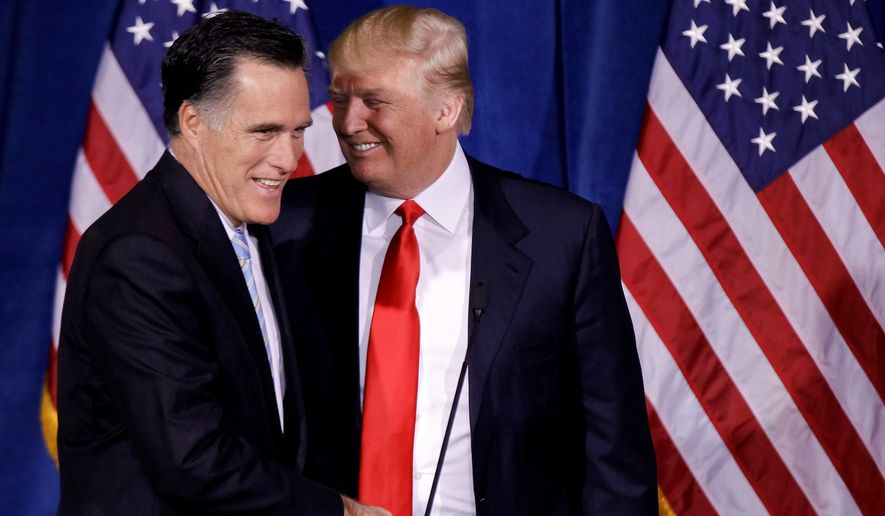Donald Trump’s electoral map looks worse than Mitt Romney’s did four years ago at this point in the race, upending the billionaire businessman’s claim that his unorthodox appeal would be able to put new states in play for the GOP.
He has done just that — only it’s mostly been in the wrong direction, leaving him struggling to win states that have been deep red for generations.
Political handicappers now say Mr. Trump could end up with fewer electoral college votes than Mr. Romney — who lost to President Obama by a 332-206 margin, and whom Mr. Trump has described as a “stone cold loser” and a “choke artist.”
“There was a lot of bluster from the Trump campaign early on about playing in New York and California, but the reality is much different,” said Nathan Gonzales of the Rothenberg & Gonzales Political Report, a nonpartisan group that tracks elections.
The good news for Mr. Trump is that he appears to be on stronger footing than Mr. Romney was in Iowa and Ohio, according to recent polling averages.
The bad news is he is worse off in Colorado, Florida, Michigan, New Hampshire, North Carolina, Pennsylvania, Wisconsin and Virginia, and also is putting out fires in Georgia and Arizona, which have been GOP strongholds. Even in Utah, one of the most conservative states in the country, GOP domination is threatened by the emergence of third-party candidates.
The University of Virginia’s Center for Politics currently has Mrs. Clinton winning 341 electoral votes compared to 197 for Mr. Trump. Mr. Gonzales’ outfit paints a similar picture, showing Mrs. Clinton is leading Mr. Trump by a 279-to-191 vote margin, with 68 more electoral votes up for grabs in Florida, Iowa, North Carolina and Ohio.
“Any Republican has a narrow path, and Romney had a path that included states such as Colorado and Virginia, Ohio and Florida, but Trump has been unable to replicate that map because, I think, Colorado and Virginia are only on the edges of competitiveness now,” he said.
Mr. Trump had argued he would not only win those states but that he’d re-establish Republicans in the Rust Belt. He’s invested a striking amount of time in Pennsylvania, in particular.
The Trump campaign didn’t return a message seeking comment on the latest projections, but Mr. Trump himself, who during the primaries gloated over polls, now tells his supporters not to pay attention to them.
“I don’t even believe the polls,” he said this week, arguing his sliding numbers are belied by his campaign rallies, which routinely attract thousands of energetic supporters.
“I have a feeling this is another Brexit,” Mr. Trump said, alluding to Britain’s vote to leave the European Union this year that shocked many. “I think the media is trying to discourage our people from getting out and voting,” he added.
Mr. Trump’s map appeared to shrink earlier this month after paid campaign staffers were asked to relocate from Virginia — a reliably red state until 2008 — to neighboring North Carolina, which voted for Mr. Obama in 2008 but backed Mr. Romney in 2012.
Dick Wadhams, a GOP operative, said Mr. Trump also faces a heavy lift in Colorado following the release of the audio and video recordings from 2005 in which Mr. Trump boasted about groping women, but that he has since played off as locker room talk.
“Probably at this moment he is in a more difficult position than Romney was three weeks before the election in 2012, and I think his difficulty is that this Access Hollywood tape probably eroded his ability to appeal to those all-important Republican and unaffiliated women in the Denver suburbs that are so critical in determining who wins a statewide race,” Mr. Wadhams said. “I just think he has a really big hill to climb with that part of the electorate.”
Mr. Trump has the same struggles 2,000 miles across the country in New Hampshire, according to Dante Scala, political science professor at the University of New Hampshire.
“Trump’s clearly in worse shape than Romney in 2012,” Mr. Scala said, adding he also has been hurt by the party’s reluctance to unify behind him.
Republicans have failed to collect the 270 electoral votes needed to win the White House since President George W. Bush carried Colorado, Iowa, Florida, Nevada, North Carolina, Ohio and Virginia on his way to defeating then-Massachusetts Sen. John F. Kerry by a 286-to-251 vote margin.
With the sole exception of North Carolina, Mr. Obama won those states in 2012.
Former Romney staffers say Mr. Trump’s struggles prove the former Massachusetts governor deserves more credit for the race he ran against Mr. Obama, an incumbent president, four years ago.
“His opponent is as popular as a skunk at a garden party, and Trump has proven to be a big-league choke artist, and he is on track for a historic and humiliating defeat in race that would have been won by any other Republican,” said Ryan Williams, an ex-Romney aide.
• Seth McLaughlin can be reached at smclaughlin@washingtontimes.com.




Please read our comment policy before commenting.